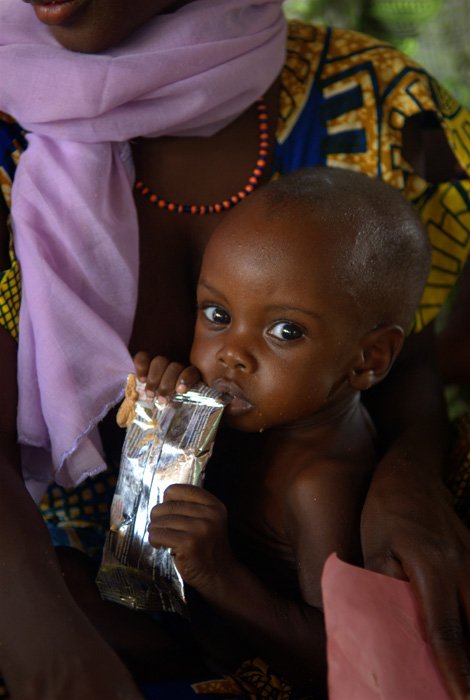Malnutrition - 10 stories that mattered in access to medicines in 2011

Dec 28, 2011
“No child should have to reach the brink of death before getting access to the nutrition they need to grow and thrive.”
- Dr. Susan SHEPHERD, former MSF Nutrition Advisor
Too many children suffering from malnutrition go unnoticed outside emergency hot spots
Each year, malnutrition claims millions of children’s lives – but this year, the world’s attention was drawn to the dramatic numbers of children suffering from malnutrition as the refugee crisis in the Horn of Africa unfolded. Thousands of Somali families fled their homes for refugee camps in neighbouring countries, triggering a massive aid operation to provide them with emergency food aid.
For several years, MSF has been treating children who are routinely made vulnerable to malnutrition with food supplements containing all the essential nutrients a child needs to grow, in order to protect them from becoming malnourished. Access to animal-source protein for children under two is critical to their growth and development.
But this work has been exceptional, and in general, the food distributed to young children as a part of routine food aid doesn’t contain the right amounts of minerals, vitamins and proteins that allow a child to stay healthy and develop normally.
The emergency response to the Horn of Africa crisis shows the quality of nutritional programmes in emergency situations is at least improving: the food aid provided in the refugee camps did contain the nutrient-dense foods adapted to children’s nutritional needs.
However emergencies – while attention-grabbing – are only part of a much larger story of on-going childhood malnutrition that occurs outside the media spotlight in areas like South Asia and Africa.
Providing nutritious food to young children is the cornerstone of every attempt to fight malnutrition in both rich and developing countries. In 2010, MSF witnessed a reduction by half in the mortality among children in Niger who received nutrient-dense foods as part of supplementary feeding programmes. Niger has undertaken large-scale distributions of supplementary foods for children under two at risk of malnutrition in both 2010 and 2011.
Improvements in the way we tackle childhood malnutrition are clearly underway, but more efforts are needed to ensure that nutritious food reaches all vulnerable young children wherever they live, and not just those in emergency hot spots.
- Dr. Susan SHEPHERD, former MSF Nutrition Advisor
Too many children suffering from malnutrition go unnoticed outside emergency hot spots
Each year, malnutrition claims millions of children’s lives – but this year, the world’s attention was drawn to the dramatic numbers of children suffering from malnutrition as the refugee crisis in the Horn of Africa unfolded. Thousands of Somali families fled their homes for refugee camps in neighbouring countries, triggering a massive aid operation to provide them with emergency food aid.
For several years, MSF has been treating children who are routinely made vulnerable to malnutrition with food supplements containing all the essential nutrients a child needs to grow, in order to protect them from becoming malnourished. Access to animal-source protein for children under two is critical to their growth and development.
But this work has been exceptional, and in general, the food distributed to young children as a part of routine food aid doesn’t contain the right amounts of minerals, vitamins and proteins that allow a child to stay healthy and develop normally.
The emergency response to the Horn of Africa crisis shows the quality of nutritional programmes in emergency situations is at least improving: the food aid provided in the refugee camps did contain the nutrient-dense foods adapted to children’s nutritional needs.
However emergencies – while attention-grabbing – are only part of a much larger story of on-going childhood malnutrition that occurs outside the media spotlight in areas like South Asia and Africa.
Providing nutritious food to young children is the cornerstone of every attempt to fight malnutrition in both rich and developing countries. In 2010, MSF witnessed a reduction by half in the mortality among children in Niger who received nutrient-dense foods as part of supplementary feeding programmes. Niger has undertaken large-scale distributions of supplementary foods for children under two at risk of malnutrition in both 2010 and 2011.
Improvements in the way we tackle childhood malnutrition are clearly underway, but more efforts are needed to ensure that nutritious food reaches all vulnerable young children wherever they live, and not just those in emergency hot spots.





Leave a Comment